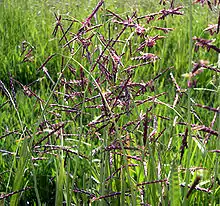| Pleuropogon californicus | |
|---|---|
 | |
| Scientific classification | |
| Kingdom: | Plantae |
| Clade: | Tracheophytes |
| Clade: | Angiosperms |
| Clade: | Monocots |
| Clade: | Commelinids |
| Order: | Poales |
| Family: | Poaceae |
| Subfamily: | Pooideae |
| Genus: | Pleuropogon |
| Species: | P. californicus |
| Binomial name | |
| Pleuropogon californicus | |
| Synonyms | |
|
Pleuropogon davyi | |
Pleuropogon californicus is a species of grass known by the common name annual semaphoregrass. It is endemic to northern California, where it grows in moist woodland and forest habitat, including redwood forests and nearby wetlands.
Description
Pleuropogon californicus is an annual or perennial bunch grass growing decumbent or erect in clumps of stems up to nearly 1 metre (3.3 ft) in maximum height.
The inflorescence bears widely spaced narrowly cylindrical spikelets which hang sideways off the stem, resembling semaphore signals. Each spikelet may be up to 5 centimeters long and may contain 20 flowers.
External links
![]() Media related to Pleuropogon californicus at Wikimedia Commons
Media related to Pleuropogon californicus at Wikimedia Commons
- Jepson Manual Treatment: Pleuropogon californicus
- USDA Plants Profile
- Pleuropogon californicus — U.C. Photo gallery
This article is issued from Wikipedia. The text is licensed under Creative Commons - Attribution - Sharealike. Additional terms may apply for the media files.